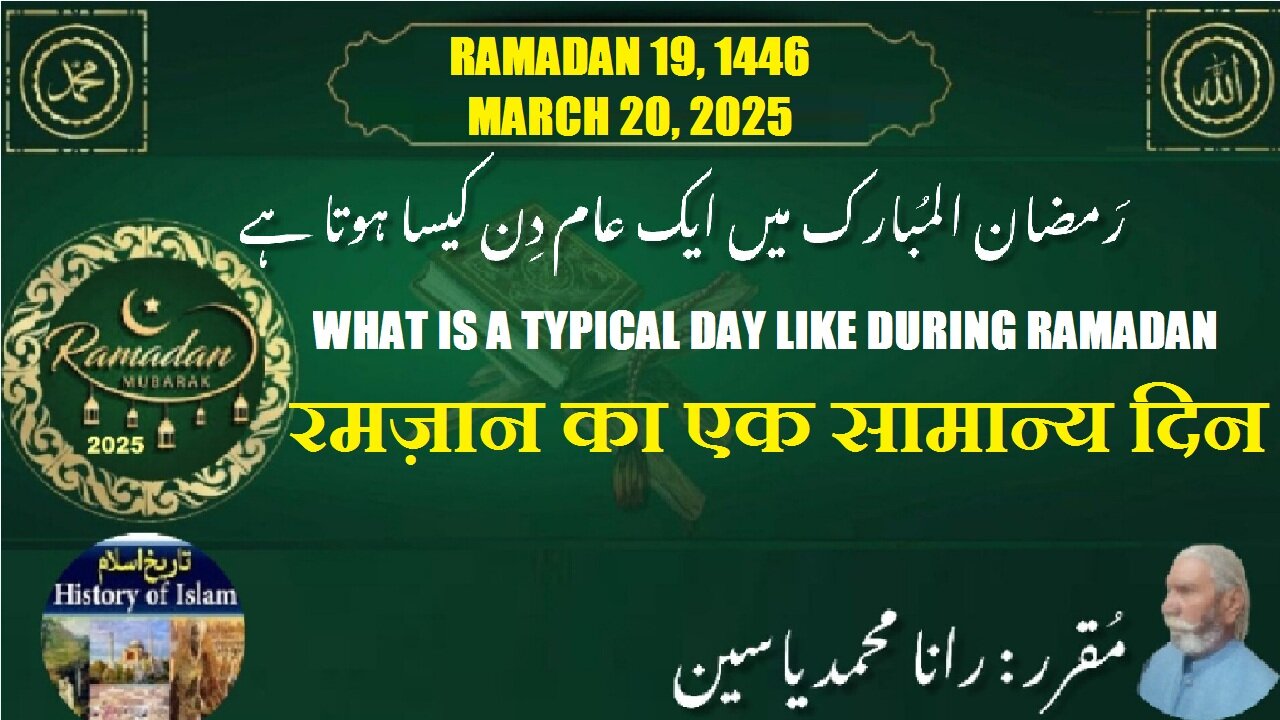Premium Only Content

What is a typical day like during Ramadan रमज़ान का एक सामान्य दिन مضان میں ایک عام دن کیسا ہوتا ہے
@islamichistory813 #ramadan2025 #cultural#awareness #fasting #understanding #ramadan #faith #community #cultural #insights #journey #spiritual #reflection
What is a typical day like during Ramadan?
Asslamoalaikum, In this enlightening islamic informative video, we are describing the essence of a typical day during Ramadan, a month of fasting, reflection, and community for millions around the world. Viewers will gain insight into the daily routines, spiritual practices, and cultural traditions that define this sacred period. please be with us upto end of this video as we delve into the significance of pre-dawn meals, the experience of fasting throughout the day, and describe the joy of breaking the fast at sunset. This video aims to foster understanding and appreciation of Ramadan's profound impact on individuals and communities alike.
Ramadan is a sacred month observed by Muslims worldwide, marked by **fasting, prayer, self-discipline, and spiritual reflection**. During this month, daily life takes on a unique rhythm, balancing religious devotion with regular activities. The day is structured around the fasting hours, from **dawn (Fajr) to sunset (Maghrib)**, and is punctuated by prayers, meals, and acts of worship. While the routine may vary depending on location, culture, and personal commitments, a typical day in Ramadan follows a distinctive pattern that enhances faith, discipline, and community spirit.
The day begins early, before **dawn**, with **Suhoor (pre-dawn meal)**. This meal is crucial as it provides energy for the day ahead. Muslims wake up well before Fajr to eat a **nutritious and filling meal**, ensuring they stay hydrated and consume foods that provide **slow-releasing energy**, such as whole grains, fruits, dairy, and proteins. The Prophet Muhammad (PBUH) encouraged Suhoor, stating, *"Eat Suhoor, for in Suhoor there is blessing."* (Sahih Bukhari). After Suhoor, Muslims perform **Fajr prayer**, the first of the five daily prayers, seeking Allah’s guidance and blessings for the day. Some may choose to **recite the Quran** or engage in quiet contemplation before going back to sleep if their schedule allows.
For those who have work, school, or daily responsibilities, the morning continues as usual, though with **a heightened sense of spiritual awareness**. Despite the absence of food and drink, many find themselves more focused and productive, as fasting encourages **self-discipline and mindfulness**. Those who do not have work may dedicate more time to **reading the Quran, making dua (supplication), and performing extra acts of worship**.
By midday, Muslims perform the **Dhuhr prayer** and continue their daily tasks while conserving energy. Some may take short naps to **rejuvenate their bodies and minds**, a practice that aligns with the Sunnah (tradition) of the Prophet Muhammad (PBUH). As the afternoon progresses, fatigue may set in, but the awareness of **spiritual rewards** keeps many motivated. The **Asr prayer**, performed in the late afternoon, serves as a reminder of patience and perseverance.
As sunset approaches, anticipation builds for **Iftar (breaking the fast)**. Muslims prepare to end their fast at **Maghrib**, usually with **dates and water**, as was the tradition of the Prophet (PBUH). This practice helps to **restore blood sugar levels** and provides an instant energy boost. After breaking the fast, Muslims offer the **Maghrib prayer** before sitting down for a wholesome meal with family or the community. The Iftar meal varies across cultures, but it generally includes **a balance of proteins, carbohydrates, and healthy fats** to replenish the body.
Following Iftar, the night takes on a special significance. The **Isha prayer** is performed, followed by **Taraweeh**, a special night prayer observed only in Ramadan. Taraweeh can be performed at home or in mosques, where congregational prayers create an **uplifting spiritual atmosphere**. These prayers often include **long recitations of the Quran**, allowing Muslims to immerse themselves in its teachings. Many dedicate time to **making dua**, seeking forgiveness, and engaging in acts of charity, as Ramadan is known as **the month of mercy and generosity**.
For some, the night extends into **Tahajjud (late-night voluntary prayer)**, a deeply spiritual time for private worship and connection with Allah. As Ramadan progresses, particularly in the last ten nights, Muslims intensify their devotion, hoping to **witness Laylatul Qadr (The Night of Power), a night better than a thousand months**, when prayers and good deeds are multiplied in reward.
Despite the challenges of fasting, a typical day in Ramadan is filled with **purpose, discipline, and spiritual fulfillment**. Muslims experience **increased gratitude, self-control, and a stronger sense of community**, making this month a transformative time for personal and spiritual growth.
Allah Hafiz
=========================================
-
 7:08
7:08
ISLAMIC HISTORY
4 hours agoBiography of Scholar Abd al-Rahman ibn Faqi Mahmud سوانح حیات عبدالرحمٰن بن فقی محمود
6 -
 LIVE
LIVE
Futures Edge: Finance Unfiltered with Jim Iuorio and Bob Iaccino
1 hour ago $0.69 earnedSeptember Surge: What It Means for Q4
153 watching -
 1:41:57
1:41:57
The Quartering
2 hours agoMotive In Church Attack Revealed, Dangerous Walmart Food Kills, Eric Adams Out & More
128K20 -
 DVR
DVR
The Trish Regan Show
1 hour agoBREAKING: NFL Picks Anti-Trump Rapper Bad Bunny for Super Bowl—Risking MASSIVE Fan Boycott!
9.97K5 -
 45:18
45:18
Stephen Gardner
2 hours ago🚨EXPOSED: Real reason Trump preparing for war - Tulsi Gabbard WARNS Trump!!
11.8K28 -
 4:23:04
4:23:04
Right Side Broadcasting Network
8 hours agoLIVE REPLAY: President Trump Participates in a Press Conference With Prime Minister Netanyahu - 9/29/25
91.6K38 -
 1:09:19
1:09:19
The White House
5 hours agoPresident Trump Participates in a Bilateral Meeting with the Prime Minister of the State of Israel
26.2K32 -
 1:25:35
1:25:35
Russell Brand
4 hours agoMichigan Church Shooting Sparks Trump Warning Of ‘TARGETED ATTACK On Christians’ - SF641
170K47 -
 1:59:24
1:59:24
The Charlie Kirk Show
4 hours agoRemembering Charlie's Martyrdom and Continuing His Revival | Driscoll, McPherson | 9.29.2025
189K53 -
 1:34:24
1:34:24
Sean Unpaved
4 hours agoEuropeans Too Good, Lamar's Limp-Off, & the MLB's Playoff Party: Weekend Sports Review
39.7K4